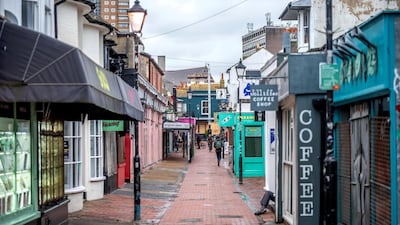British consumer prices rose to a three-month high in January when lockdown restrictions in England and tighter measures across the rest of the country forced the closure of non-essential shops.
Consumer Price Inflation increased to 0.7 per cent last month from December's 0.6 per cent annual increase, the Office for National Statistics said on Wednesday, pushed up by higher food prices and less reductions by furniture retailers.
"Inflation rose slightly in January, with food prices increasing. Household goods also pushed up prices with less discounting this year on items such as bedding and settees," ONS statistician Jonathan Athow said.
Inflation has stayed below the Bank of England's 2 per cent target since mid-2019 with the Covid-19 lockdown in the first wave of the pandemic last year pushing it close to zero when the economy tanked.
Earlier this month, the BoE said that it expected inflation to pick up quite sharply towards its 2 per cent target in spring, as last year's emergency cut in value-added tax expires and global oil prices rise on expectations of recovery.
The rise in January’s inflation came despite Covid restrictions prompting retailers to discount more heavily than normal, particularly on clothing and footwear.
Clothing prices rose slightly in December but fell 4.6 per cent on the month, the biggest drop in seven years, and recorded a 3.8 per cent annual fall.
Another major contributor to rising costs was the hospitality sector, with prices increasing 0.9 per cent largely driven by hotels.
Janine Boshoff, economist at the National Institute of Economic and Social Research, said that consumer prices bottomed out in December 2020 but she expected inflation to rise over the course of the year.
“While the January lockdown is likely to have a moderating impact on inflation in the short-term, the success of mass vaccination could boost economic activity and increase inflation in the latter half of the year,” she said.
Paul Dales, chief economist at Capital Economics, said that rising prices in January are “a bit of a sideshow to the probable leap in inflation to around 2 per cent in April", which will factor in last year’s plunge in fuel prices and the reversal of the temporary hospitality VAT cut.
“The unwinding of the downward effects of last August’s Eat Out to Help Out restaurant scheme will push it higher still in August. By December, CPI inflation may be around 2.5 per cent,” he said.
In 2022, Mr Dales expects a fall back in oil prices, the effects of the stronger pound and the legacy of spare capacity to drag inflation back below 2 per cent.
Analysts also expect prices of some imported products will rise because of Britain's new, more restrictive trading relationship with the European Union, which led to disruption and delays at ports last month.
The ONS said it had not seen any evidence of new Brexit-related custom fees and transport costs pushing up consumer prices in January.
Mr Dales said that the combination of high global shipping costs, the effect of Brexit and a desire to recoup lost revenues once businesses reopen could keep inflation above 2 per cent for longer.
“Even in that case, over the next few years we suspect the BoE would still prioritise supporting growth over reducing inflation,” he said.



